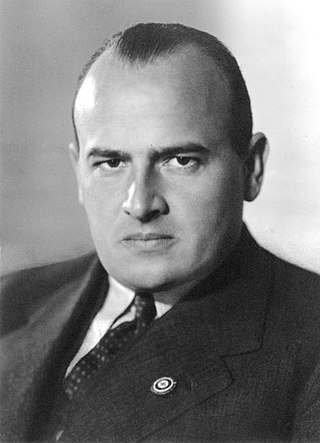
Hans Michael Frank was a German politician, war criminal, and lawyer who served as head of the General Government in German-occupied Poland during the Second World War.

Arthur Seyss-Inquart was an Austrian Nazi politician who served as Chancellor of Austria in 1938 for two days before the Anschluss. His positions in Nazi Germany included deputy governor to Hans Frank in the General Government of Occupied Poland, and Reichskommissar for the German-occupied Netherlands. In the latter role, he shared responsibility for the deportation of Dutch Jews and the shooting of hostages.

Alois Hitler was an Austrian civil servant in the customs service, and the father of German dictator Adolf Hitler.

Odilo Lothar Ludwig Globocnik was a Nazi Party official from Austria and a perpetrator of the Holocaust. A high-ranking leader of the SS, Globocnik played a leading role in Operation Reinhard, the organized murder of around one and a half million Jews, mostly of Polish origin, during the Holocaust in the Majdanek, Treblinka, Sobibór and Bełżec extermination camps. Historian Michael Allen described him as "the vilest individual in the vilest organization ever known". Globocnik killed himself shortly after his capture and detention by British soldiers.
Maria Anna Schicklgruber was the mother of Alois Hitler, and the paternal grandmother of Adolf Hitler.

Georg Ritter von Schönerer was an Austrian landowner and politician of Austria-Hungary active in the late 19th and early 20th centuries. A major exponent of pan-Germanism and German nationalism in Austria who endorsed the annexation of Austrian Germans and Austria to Germany in an Anschluss.
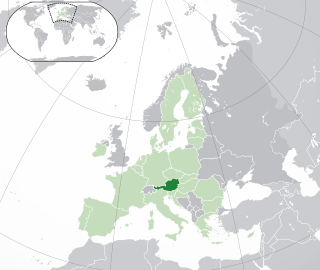
The history of the Jews in Austria begun after the exodus of Jews from Judea under Roman occupation. There have been Jews in Austria since the 3rd century CE. Over the course of many centuries, the political status of the community rose and fell many times: during certain periods, the Jewish community prospered and enjoyed political equality, and during other periods it suffered pogroms, deportations to concentration camps and mass murder, and antisemitism. The Holocaust drastically reduced the Jewish community in Austria and only 8,140 Jews remained in Austria according to the 2001 census. Today, Austria has a Jewish population of 10,300 and a total of 33,000 when including any Austrian with at least one Jewish grandparent.
Hedi Stadlen, better known in Sri Lanka as Hedi Keuneman, was an Austrian Jewish philosopher, political activist, and musicologist. She was one of a handful of European Radicals in Sri Lanka.

Honorary Aryan was a semi-official category and expression used in Nazi Germany to justify the exceptional awarding of Aryan certificates to some regime-favoured Mischlinge who according to Nuremberg Laws standards would not have been recognized as belonging to the Aryan race, but whom German officials nevertheless chose to spare persecution.
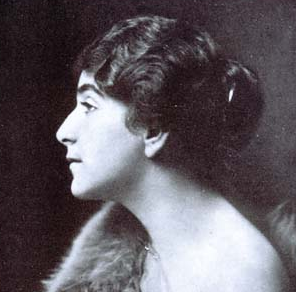
Stephanie Julianne von Hohenlohe was an Austrian princess by her marriage to the diplomat Prince Friedrich Franz von Hohenlohe-Waldenburg-Schillingsfürst, a member of the noble Hohenlohe family. She was born a commoner, allegedly of Jewish family background.

SC Hakoah Vienna is a Jewish sports club in Vienna, Austria.
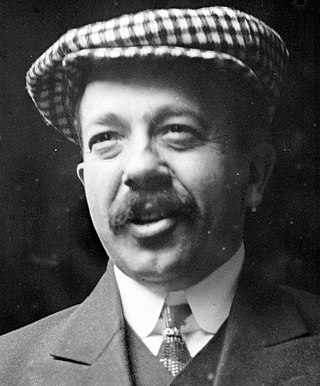
Heinrich Neumann Ritter von Héthárs was the foremost ear-nose-and-throat doctor in Vienna before World War II. In 1938 he transmitted to the Evian Conference the infamous offer by the German government to sell the Austrian Jews at a price of $250 per capita to any foreign country that would accept them and pay. This offer - and the Conference delegates' refusal to accept it - is the focal point of Hans Habe's novel The Mission (1965).

Austria was part of Nazi Germany from 13 March 1938 until 27 April 1945, when Allied-occupied Austria declared independence from Nazi Germany.
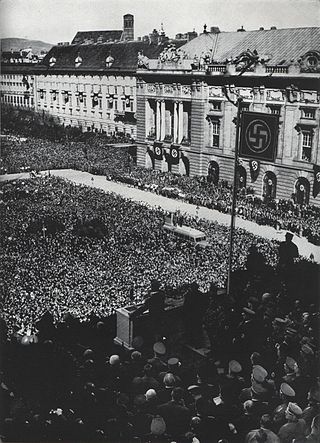
The Anschluss, also known as the Anschluß Österreichs, was the annexation of the Federal State of Austria into the German Reich on 12 March 1938.
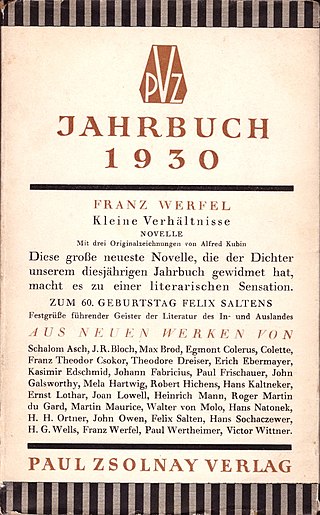
Paul Zsolnay Verlag is an Austrian publishing company.

Elisabeth Sarolta "Elsa" von Gutmann was Princess of Liechtenstein from 1929 to 1938 as the wife of Prince Franz I of Liechtenstein.

The Angel with the Trumpet is a 1950 British drama film directed by Anthony Bushell and starring Eileen Herlie, Basil Sydney, and Norman Wooland. It was based on a novel by Ernst Lothar. The film follows the rise and fall of an Austrian aristocrat, and her eventual death following the Anschluss. The film was a remake of a 1948 Austrian film Der Engel mit der Posaune.

A sham referendum on the Anschluss with Germany was held in German-occupied Austria on 10 April 1938, alongside one in Germany. German troops had already occupied Austria one month earlier, on 12 March 1938. The official result was reported as 99.73% in favour, with a 99.71% turnout. The referendum was held post factum, after the Nazi government of Austria signed a law which proclaimed Austria "a land of the German Reich" and Adolf Hitler issued the "Law on the Reunification of Austria with the German Reich" on 13 March 1938, which de jure abolished Austria as a state.
The Vugesta for "Vermögens-Umzugsgut von der Gestapo" was a Nazi looting organization in Vienna that from 1940 to 1945 seized the possessions of 5,000-6,000 Viennese Jews. It was a key player in the aryanization of Jewish property, redistributing private property stolen from Jewish Austrians to non-Jewish or Aryan Austrians during the Nazi reign in Austria.
Jews were systematically persecuted, plundered and killed by German and Austrian Nazis in the Holocaust from 1938 to 1945. Pervasive persecution of Jews was immediate after the German annexation of Austria, known as the Anschluss. An estimated 70,000 Jews were murdered and 125,000 forced to flee Austria as refugees.















